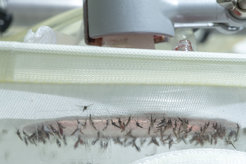Metabolic balancing between mosquito and malaria parasites
A female mosquito bites humans to secure nutrients for its own egg production. The blood meal not only nurtures the eggs, but also makes mosquitoes dangerous vectors of infectious diseases. Blood-borne pathogens such as the malaria parasite use the mosquito’s biting behavior to be transferred from one to the next individual.
Only few malaria parasites are taken up with a mosquito blood meal. Therefore, parasites need to multiply in the mosquito to increase the chances of being transmitted to another person. The parasites get necessary fats, sugars and amino acids from the mosquito. However, the mosquito consumes most of the nutrients for its own reproduction. It is essential for parasites that the mosquito does not exhaust their nutrient storage for its own egg production. In an earlier publication, Elena Levashina and her team showed that malaria parasites mainly use the surplus nutrients of the hosting mosquito after it had completed its own reproductive cycle.
In the current work, the researchers took a closer look at what will happen to the parasites if the mosquito exhausts its resources during egg development. By identifying a decisive controlling factor, micro-RNA-276, they increased the duration of mosquito nutrient consumption. In the absence of miR-276, nutrient degradation for egg production lasted longer. As expected, directing more nutrient to reproduction, increased mosquito fertility. However, this increase in fertility counteracted the development of malaria parasites. As a consequence, fewer transmissible forms of the parasite were generated for the next mosquito bite.
So far, little is known about the mosquito factors that influence transmission of malaria parasites. "By linking mosquito metabolism and parasite development our study offers an insight into why some mosquitoes transmit more parasites than others. This information is important in the fight against malaria," says Lena Lampe, first author of the study. Mosquito metabolism could therefore be a promising target for malaria control.

Mosquitoes are fed donated blood in the laboratory. The mosquitos use the nutrient-rich blood meal for their egg production - but malaria parasites are also the beneficiaries of this nutrient supply.
